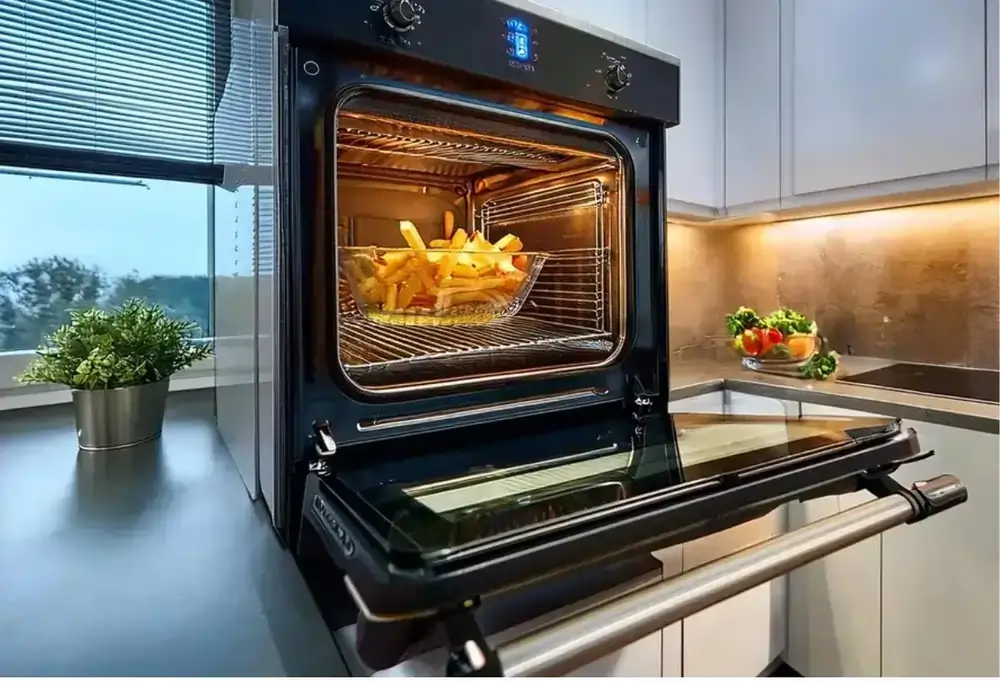Introduction
Imagine this: It’s a busy weeknight, and you need dinner fast, but you still want something home-cooked. A few years ago, you’d juggle a conventional oven to get that chicken nuggets tray crispy, hoping your pizza doesn’t burn. Today, AI-powered smart ovens and kitchen appliances have taken the guesswork out of cooking, delivering gourmet-level results with minimal effort. I remember the first time I used my Breville Smart Oven Air Fryer—it felt like the future had arrived in my kitchen.
Artificial intelligence (AI) is revolutionizing industries like health and entertainment and transforming how we cook. From simple tasks like toasting slices of bread to perfectly air-frying green beans, AI-powered kitchen appliances are enhancing both convenience and creativity in the culinary world.
TL;DR:
- AI-powered smart ovens are revolutionizing home cooking with precision and convenience.
- Appliances like the Breville Smart Oven Air Fryer combine air frying and convection oven capabilities for versatile cooking.
- Benefits include healthier meals, energy Efficiency, and automated cooking processes.
- Smart kitchen devices integrate seamlessly with other appliances, improving meal planning and preparation.
- Data privacy and technical learning curves are potential concerns that outweigh the advantages.
Understanding AI in Kitchen Appliances
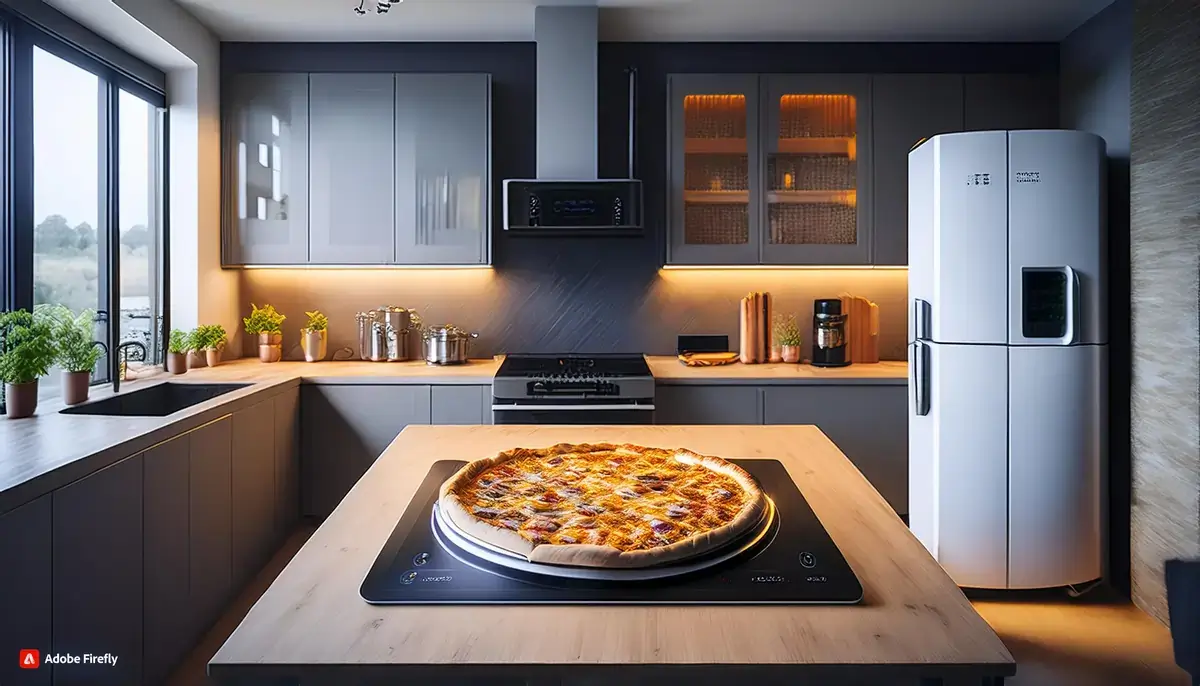
Artificial intelligence in kitchen gadgets may sound like something out of a sci-fi movie, but it’s here and convenient. AI in smart ovens involves features like machine learning, which allows the oven to learn your preferences and voice control so you can preheat the oven using assistants like Google Home or Alexa. These ovens are Wi-Fi-connected and can recognize the type of food you’re cooking, adjusting settings accordingly whether baking rustic sourdough bread or a pizza; smart ovens like the Breville Smart Oven Air Fryer Pro or the Tovala Smart Oven Pro know precisely what to do.
With appliances like the Breville Smart Oven Pro offering a range of preset cooking modes—from air frying to convection cooking—you no longer need to babysit your meals. You simply select the mode, let the oven decide the best cooking temperature, and sit back as it handles everything, whether you’re making a batch of cookies or roasting chicken.
Learn more about Smart Home Hub Integration with kitchen appliances.
The Evolution of Smart Ovens
Let’s take a quick step back. Traditional ovens used manual temperature control; any variation meant undercooked or overcooked meals. From these humble beginnings, kitchen ovens have evolved into sophisticated gadgets capable of precision cooking. Early models couldn’t dream of what today’s smart ovens do with their air fry modes, steam functions, and convection settings.
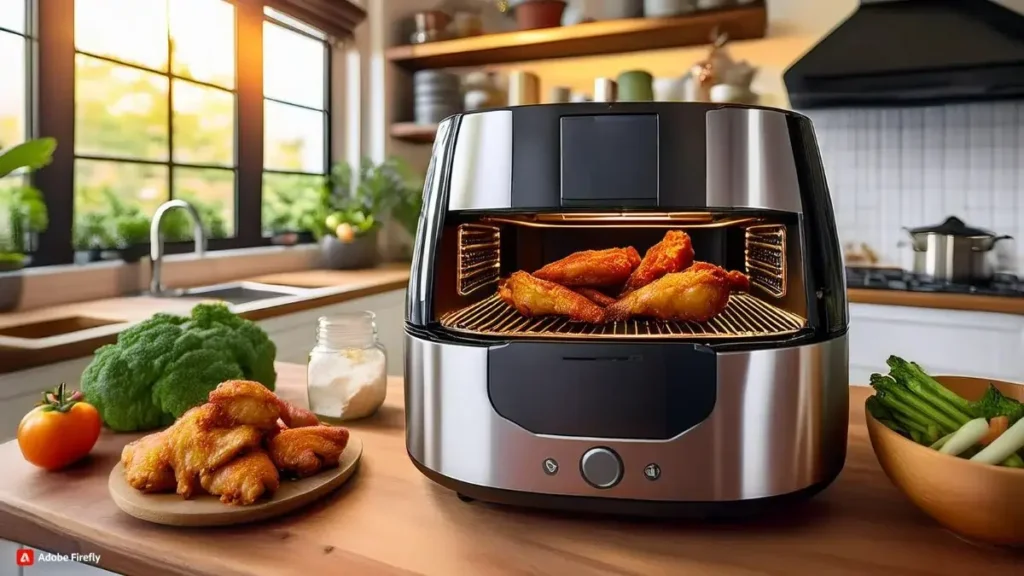
Smart ovens, like the Breville Smart Oven Air Fryer Pro and Panasonic FlashXpress Toaster Oven, now offer powerful mini ovens in compact sizes. These ovens can fit a 13-inch pizza and have multiple cooking functions, like air frying and broiling, making them a versatile addition to any kitchen. Thanks to these high-tech devices, you can now effortlessly switch between convection cooking for baked dishes or the air-fryer toaster oven mode for crispy fries.
Leading brands such as GE, Samsung, and Bosch are innovating with ovens that include oven lights, oven racks, and larger oven cavities designed for everything from a slice of pizza to batch cooking. The Wolf Gourmet Elite Countertop Oven even comes with a built-in broiling tray, and the Anova Precision Oven integrates steam components for the ultimate precision in meal preparation.
Check out this article on setting up your smart home kitchen.
How AI is Changing Cooking
AI-powered appliances like the Tovala Smart Oven and the Breville Smart Oven Air Fryer have completely reshaped how we approach cooking. These devices can scan barcodes on meal kits or frozen foods and automatically adjust the cooking times and oven temperatures. Whether you’re slow cooking with the 6-quart Lodge Dutch oven or making a pizza in the Panasonic FlashXpress Toaster Oven, AI ensures optimal results every time.
For example, the Breville Smart Oven Air Fryer uses air-fry baskets and preset modes for various foods, such as chicken nuggets, roasted vegetables, or a 12-inch pizza. With AI-driven convection cooking speeds and fan speed adjustments, it knows how to maintain a consistent temperature throughout the entire cooking cycle, so you get the perfect toast, crispy fries, or a beautifully baked pie.
Explore this guide to go deeper into Smart Energy Management.
Benefits of Smart Ovens
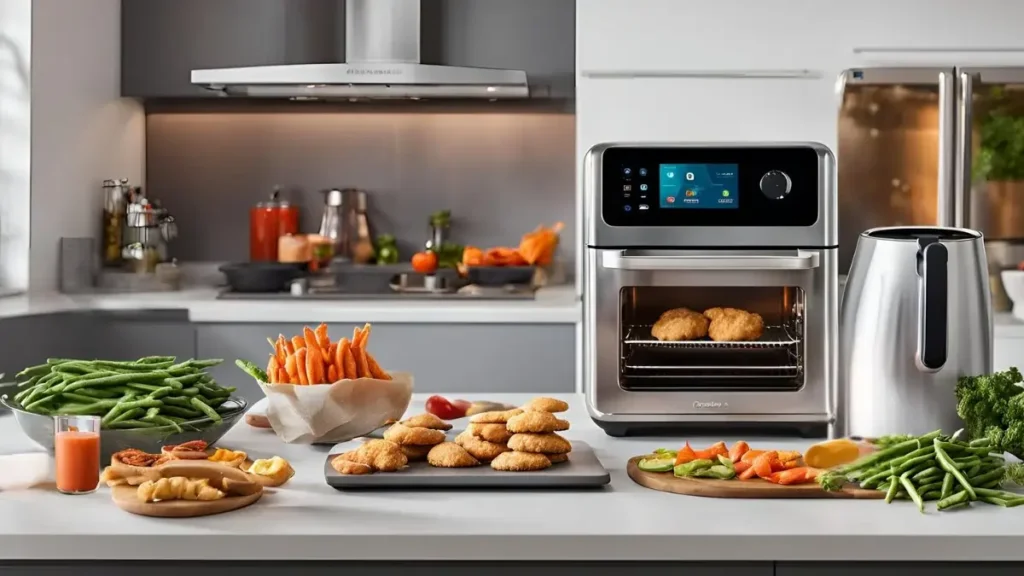
The main benefit of smart ovens is their convenience. They save time and reduce the need for constant monitoring. Appliances like the Breville Smart Oven Pro include features like a timer dial and preset functions for roasted chicken. At the same time, the Hamilton Beach 4 Slice Toaster Oven has more straightforward manual controls.
Smart ovens also contribute to energy Efficiency. Using precise temperature settings and faster cooking cycles, they consume less power than traditional full-size ovens. Air frying and convection settings enhance Efficiency by cooking food quicker and more evenly.
Another perk is healthier cooking. AI-powered ovens can track the nutritional content of your cooking, enabling you to make better food choices. Air frying uses far less oil than traditional frying methods, making your meals lighter but still crispy and delicious.
Integration with Other Smart Appliances
In modern kitchens, smart ovens don’t work alone—they’re part of an integrated ecosystem. The Tovala Smart Oven is an excellent example of this, as it syncs with meal kits and your smartphone to streamline the cooking Process. Pair your smart oven with a smart fridge that tracks ingredient freshness, or use voice-controlled smart home assistants like Alexa to adjust the temperature or check cooking progress.
Smart kitchens with multiple devices interacting seamlessly aren’t just a fantasy—they’re here. Imagine preparing dinner while your smart oven manages the food, your smart fridge suggests a side dish, and your Smart Home Hub adjusts the lights and music to create the perfect dining atmosphere.
Challenges and Concerns
As fantastic as smart ovens are, they do come with challenges. First, there’s the issue of data privacy. With Wi-Fi-connected devices, there’s always a potential risk of compromised data. Manufacturers like Breville and Bosch offer robust security features, but it’s something to consider.
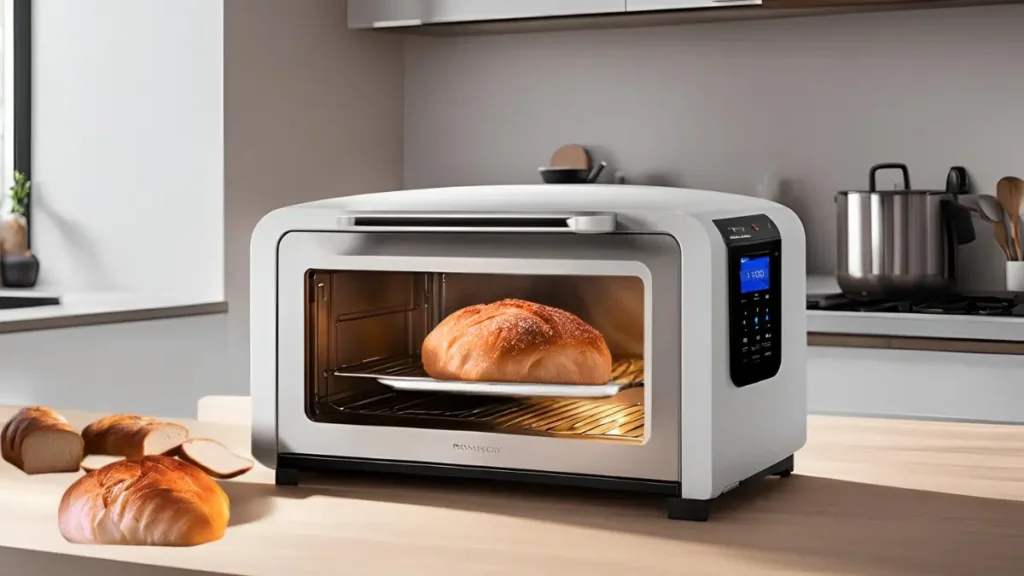
Additionally, while the learning curve for these appliances isn’t steep, it does exist. Some users may struggle to adjust to the multiple settings for proofing bread or the nuances of adjusting convection settings. However, these devices come with excellent one-year or three-year limited warranties, so if anything does go wrong, there’s support.
The Future of AI in Kitchens
The future of AI-powered kitchen appliances is inspiring. We’re already seeing Wi-Fi-connected countertop models that can predict your cooking needs and suggest recipes based on the contents of your fridge. Appliances like the Ovenby Michael push boundaries with steam injection features and phase cook capabilities.
Soon, smart ovens will include even more advanced air probes and quartz heating elements to eliminate guesswork in cooking. Expect more integration with other smart kitchen gear, from fridges to smart doorbells, to create a fully automated home cooking experience.
Conclusion
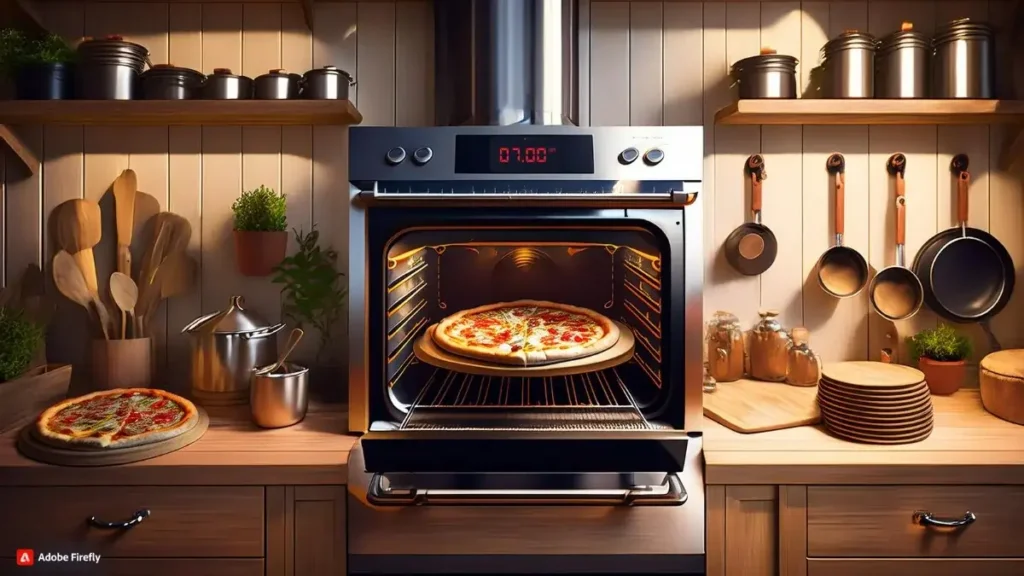
The evolution of AI-powered kitchen appliances and smart ovens has made cooking more accessible, enjoyable, and efficient. From the Breville Smart Oven Air Fryer‘s air-fry baskets to the precise convection settings of the Anova Precision Oven, these devices are reshaping how we approach meal preparation. Healthier, quicker, and more convenient cooking is now within reach.
So, whether you’re in the market for an affordable oven like the Black+Decker 4-Slice Toaster Oven or a high-end Breville Smart Oven Pro, an AI-powered solution fits every kitchen and lifestyle.
Internal Links:
FAQ: Understanding Smart Ovens
1: What is a smart oven?
A smart oven is a kitchen appliance with Wi-Fi or Bluetooth connectivity that allows users to control cooking settings remotely via a smartphone app or voice commands. Many models include advanced features such as automatic cooking programs, recipe suggestions, and even integration with other smart home devices.
2: How do smart ovens work?
Smart ovens use sensors and connectivity Technology to monitor cooking progress and adjust settings automatically. Users can preheat the oven, set cooking times, or change temperatures remotely and receive notifications when their food is ready. Some models even learn user preferences over time, optimizing the cooking.
3: What are the benefits of using a smart oven?
Smart ovens offer numerous benefits, including convenience, precise cooking, Energy Efficiency, and enhanced safety features. Users can achieve perfectly cooked meals with less guesswork, save time by presetting tasks, and monitor their cooking from anywhere in the house or outside.
4: Are smart ovens compatible with voice assistants?
Most smart ovens are compatible with popular voice assistants such as Amazon Alexa and Google Assistant. This allows users to control their oven hands-free, adjust settings with simple voice commands, and integrate cooking with other home smart devices.
5: Can I use a smart oven if I don’t have Wi-Fi?
While some essential functions can be utilized without Wi-Fi, most smart functionalities require an internet connection. However, many smart ovens also have manual controls, allowing you to cook traditional recipes without using smart features.
6: How much do smart ovens cost?
The price of smart ovens can vary significantly based on features and brand, typically starting from around $500 to upwards of $3,000 for high-end models. When evaluating smart oven options, it’s essential to consider both the initial investment and potential energy savings.
7: Do smart ovens require unique cookware?
In general, smart ovens do not require unique cookware. However, it’s advisable to use oven-safe materials that can withstand varying temperatures and cooking methods. Always refer to the oven’s manual for specific recommendations regarding cookware.
8: What safety features do smart ovens offer?
Many smart ovens have enhanced safety features, including automatic shut-off capabilities, child lock functions, and notifications for unsafe temperature levels. These features help to prevent accidents and ensure a safer cooking environment.
9: How can I maintain my smart oven?
Regular maintenance is essential for the longevity of your smart oven. Keep the interior clean, periodically check for software updates through the app, and inspect the door seals for wear and tear. Always refer to the manufacturer’s guidelines for specific maintenance recommendations.
10: What are some popular brands of smart ovens?
Some of the leading brands in the smart oven market include Breville, Samsung, Whirlpool, GE Appliances, and Bosch. Each offers unique features and capabilities, catering to various cooking styles and preferences. Researching each brand’s offerings can help you choose the best model.
11: Is it worth getting a smart oven?
Smart ovens offer significant advantages for those looking to enhance their cooking experience. They use advanced Technology to optimize cooking times, provide precise temperature control, and suggest recipes. Many also come with features like Wi-Fi connectivity, voice commands, and food recognition, making meal preparation more convenient and efficient. A smart oven is worth considering for those who value convenience and tech integration in the kitchen.
12: What is the alternative to the Tovala smart oven?
Alternatives to the Tovala smart oven include AI-powered ovens like the June Oven, Brava Oven, and Breville Smart Oven. These ovens also offer features such as app control, smart cooking programs, and precise temperature adjustments, allowing for similar convenience in cooking without Tovala’s meal delivery system.
13: June Smart Oven being discontinued?
As of now, the June Smart Oven is not being discontinued. It continues to be a popular option in the Smart kitchen appliance market. The company behind the June Oven is still active, regularly updating software and offering new features, making it a well-maintained product.
14: What is the difference between the smart oven and the smart oven pro?
The Smart Oven Pro typically offers more features than a standard smart oven. For example, the Breville Smart Oven Pro has a slow-cook function and an interior oven light, which are not found in their regular smart ovens. The Pro version may also have better heat distribution and more advanced cooking presets for precision and versatility, making it ideal for users who want more control over their cooking.


